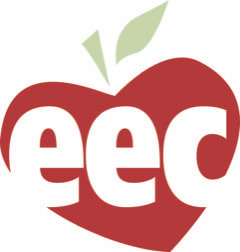COORDINATED FAMILY AND COMMUNITY ENGAGEMENT
EEC APPROVED EVIDENCE-BASED EARLY LITERACY PRACTICES AND MODELS
CFCE grantees are required to incorporate the use of evidence-based, EEC approved early literacy practices and models into their parent education and parent-child educational playgroup opportunities. Use of evidence-based early literacy curriculum enhances the capacity of CFCE grantees to help parents promote early literacy and language skill development in their children. Focusing on effective literacy models, EEC strives to create consistency in the strategies that CFCE grantees use to help families cultivate their children‘s language and literacy skills before they enter elementary school.
DIALOGIC AND INTERACTIVE READING - PEER and CROWD Sequences
PEER sequence - the role of the adult is to:
• P rompt the child with questions
• E valuate the child’s response
• E xpand the response
• R epeat the expansion
CROWD prompts - the adult asks children to:
• C omplete fill-in-the-blank
• R ecall: remember aspects of the book
• O pen-ended: describe in their own words what’s happening in the story
• Wh-: talk about what, where, who, and why aspects of the story
• D istance: make connections to personal experiences outside the story
For more information - http://www.readingrockets.org/article/400
CELL - CENTER FOR EARLY LITERACY LEARNING
The goal of the Center for Early Literacy Learning (CELL) is to promote the adoption and sustained use of evidence-based early literacy learning practices. CELL has resources for early education and care professionals, early intervention practitioners, parents, and other caregivers of all children, birth to five years of age, with particular attention to those with identified disabilities, developmental delays, and those at-risk for poor outcomes. For more information/resources - http://www.earlyliteracylearning.org/
EVERY CHILD READY TO READ
Every Child Ready to Read® @ your library® (ECRR) is a parent education initiative that emphasizes that early literacy begins with the primary adults in a child's life. The ECRR toolkit provides youth librarians, early childhood specialists, and others with research-based practices that can help young children develop skills they need before they can learn to read. For more information - http://everychildreadytoread.org/
RAISING A READER
Raising A Reader MA offers an evidence-based early literacy program that helps families of young children (ages 0-5) develop, practice, and maintain habits of reading together at home. http://raisingareaderma.org/
READ AND RISE
Read and Rise is a sustainable and systematic literacy engagement program designed to bring families, schools, and communities together to support children’s literacy development, while celebrating the positive impact of family culture and tradition. http://teacher.scholastic.com/products/face/read-and-rise.html
EEC APPROVED EVIDENCE-BASED EARLY LITERACY PRACTICES AND MODELS
CFCE grantees are required to incorporate the use of evidence-based, EEC approved early literacy practices and models into their parent education and parent-child educational playgroup opportunities. Use of evidence-based early literacy curriculum enhances the capacity of CFCE grantees to help parents promote early literacy and language skill development in their children. Focusing on effective literacy models, EEC strives to create consistency in the strategies that CFCE grantees use to help families cultivate their children‘s language and literacy skills before they enter elementary school.
DIALOGIC AND INTERACTIVE READING - PEER and CROWD Sequences
PEER sequence - the role of the adult is to:
• P rompt the child with questions
• E valuate the child’s response
• E xpand the response
• R epeat the expansion
CROWD prompts - the adult asks children to:
• C omplete fill-in-the-blank
• R ecall: remember aspects of the book
• O pen-ended: describe in their own words what’s happening in the story
• Wh-: talk about what, where, who, and why aspects of the story
• D istance: make connections to personal experiences outside the story
For more information - http://www.readingrockets.org/article/400
CELL - CENTER FOR EARLY LITERACY LEARNING
The goal of the Center for Early Literacy Learning (CELL) is to promote the adoption and sustained use of evidence-based early literacy learning practices. CELL has resources for early education and care professionals, early intervention practitioners, parents, and other caregivers of all children, birth to five years of age, with particular attention to those with identified disabilities, developmental delays, and those at-risk for poor outcomes. For more information/resources - http://www.earlyliteracylearning.org/
EVERY CHILD READY TO READ
Every Child Ready to Read® @ your library® (ECRR) is a parent education initiative that emphasizes that early literacy begins with the primary adults in a child's life. The ECRR toolkit provides youth librarians, early childhood specialists, and others with research-based practices that can help young children develop skills they need before they can learn to read. For more information - http://everychildreadytoread.org/
RAISING A READER
Raising A Reader MA offers an evidence-based early literacy program that helps families of young children (ages 0-5) develop, practice, and maintain habits of reading together at home. http://raisingareaderma.org/
READ AND RISE
Read and Rise is a sustainable and systematic literacy engagement program designed to bring families, schools, and communities together to support children’s literacy development, while celebrating the positive impact of family culture and tradition. http://teacher.scholastic.com/products/face/read-and-rise.html
Early Childhood Partners programs are funded by the Coordinated Family & Community Engagement (CFCE) grant awarded to Hamilton-Wenham Regional School District by the Massachusetts Department of Early Education and Care. The HWRSD does not discriminate in its programs, activities or employment practices on the basis of race*, color, sex, sexual orientation, gender identity, religion, disability, age, genetic information, active military/veteran status, marital status, familial status, pregnancy, or pregnancy-related condition, homelessness, ancestry, ethnic background, national origin, or any other category protected by state or federal law.


